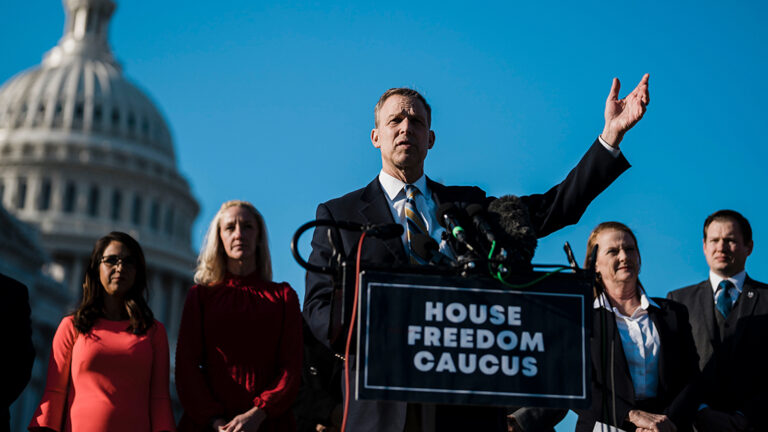Voters need much more than less-bad policies. Voters need genuinely-good party processes and government processes.
Lately, voters have been getting a rare chance to rapidly build a good party.
So far, in 11 states the Republican parties now include freedom caucuses. In 2 of these states, the 2024 Republican primaries are still to come—in Missouri on August 6, and in Wyoming on August 20.
This year the Missouri Freedom Caucus was started. Immediately, most of its members worked hard to pass initiative-petition reform.
When initiative-petition reform gets enacted, from then on it will greatly hinder out-of-state groups. Currently, they are constitutionally enabled to force their wills on the state residents in most districts, by mobilizing metro voters to amend the state constitution.
In past elections, a reformed, more widely representative process would have blocked casinos and would have blocked cannabis taxing and regulation. In the 2024 general election, a reformed process would block state constitution support for abortion. (Note that even if state constitution support for abortion is enacted, such support would still violate the Constitution by unduly depriving persons of life.) A reformed process would also block other initiatives that under the current process would still keep coming.
Initiative-petition reform was the Missouri Freedom Caucus members’ highest priority all session long. It appears to have been supported by majorities in both legislative houses. The state senator whipping for it “felt pretty confident” that the required 18 senators would “very likely vote for it” if “put on the spot.”
But this reform ended up killed by three punches to the gut:
Second, when the representatives immediately rejected the motion and sent the bill back to the senators, the lame-duck president pro tem finished running out the clock by ending early on the last day of the 2024 regular session.
Third, the Republican governor has been failing to call a special session. The Republican lieutenant governor also has been failing to call for a special session when he has temporarily been the acting governor.
This reform attempt hints that freedom caucuses have promise. They could soon block bad new policies. They are the most fully-developed approach to constitutionally limiting USA governments.
But this reform attempt also hints that at least on the development path that freedom caucuses are taking currently, freedom caucuses have shortcomings. They are allocating their scarce capital to important but even so, small-ball, defensive responses to Progressive advances. So far, in most cases their numbers are still coming up short. Their worst enemies include people who present like allies but end up like sleeper agents.
This promise can be fulfilled, and these shortcomings can be left behind in the dust, by completing a fundamental paradigm shift. What’s needed aren’t less bad policies but rather, good processes.
Use Offsetting Powers
State governments, especially, have real advantages for advancing freedom.
In many states, voting is less dominated by metro areas’ Progressives. Spends by cronies are smaller, so Progressive candidates get smaller boosts from deceptively presenting themselves as conservatives and presenting opponents as liberals. In most states, most of the successful candidates call themselves Republicans, which means that the outcomes of general elections are determined by the primaries. In primaries, the voter turnout is lower, which means that well-informed voters have more impact.
And once they’re elected, state officials control substantial state spending, state regulations, and state powers to limit the national government.
In the USA’s current House of Representatives, the percentage of members who reportedly belong to the House Freedom Caucus is 9%. In state legislative houses, more favorably, the percentages of members who openly belong to state freedom caucuses are already as high as 19%.
Freedom caucus personnel have never-before-realized potential because they are mostly getting right the single action that is the key to limiting governments: most members are using their offsetting constitutional powers to limit others in governments.
Freedom caucuses are already the most promising new party initiative since the initial Democratic Party and the Republican Party.
In the past, parties have always started out with promising personnel and programs. Successive parties offered increased freedom first from England, next from growing Federalist government, next from compromised, growing Jeffersonian Republican government, and most recently from slavery. Promising and delivering greater freedom has been what has made each successive major party rise to majority control.
But every party so far has lacked party rules that limit the party organization’s power. Not a single party has robustly offered voters candidates who use their constitutional powers against others in governments, limiting governments. Utterly lacking in built-in systemic limits, every party has soon enough broken bad and stayed bad.
Parties have instead ended up being vehicles for defying constitutional limits on governments. This is what a caucus’s members must change in order for the caucus to be not merely good-intentioned and a promising flash-in-the-pan, but instead substantially good for the long haul.
Declare Independence from Prior Caucuses
The Declaration of Independence established a meaningful name for the new nation. The declaration stated the principle that all men are created equal and are created with certain unalienable rights, including to life, liberty, and the pursuit of happiness. It listed specific grievances against the existing national government. This clearly established as a minimum standard that neither those specific actions nor any actions that are remotely similar would be committed by the declaration’s signers and successors. It was vowed and signed by politicians, at a clear and present risk of being pursued and killed as disgraced traitors. The USA government’s declaration of independence from England’s government advanced the nation along an optimal path to freedom.
Party caucus declarations of independence from prior party caucuses will be the best way to advance party caucuses along an optimal path to freedom.
A caucus declaration of independence should establish a meaningful caucus name. “Freedom Caucus” has meaning but is nonspecific, since the meaning has been blurred by the fact that current freedom caucuses include politicians who don’t support freedom strongly, as will be shown later by a discussion of constitutionalist voting scorecards. “republican Constitution Caucus,” or in short, “rConstitution Caucus,” would have a specific meaning that would endure, thanks to Randy Barnett’s defining nomenclature in Our Republican Constitution. The Constitution isn’t a democratic constitution, it’s the republican Constitution. Under the republican Constitution, individuals are sovereign, and governments are justly instituted to make individuals’ rights more secure.
Caucus declarations should establish the principle of how the Constitution secures rights:
When government people fail to respect others’ powers or when government people fail to assert their own offsetting powers, government people deny us our rights.
(The Constitution Needs a Good Party, pp. 21–22.)
Past and present violations of this principle should be documented in caucus declarations as specific, detailed grievances.
And of course caucus declarations should be signed! Unfortunately, from inception the current freedom caucuses have been organized to allow anonymous membership, and continue to this day along this same dead-end path.
rConstitution Caucus membership needs to be a brand that voters can see clearly for themselves, needs to deliver a minimum brand quality, and needs to stay good. This value proposition should be promised using a caucus declaration, and should be delivered using a caucus constitution, caucus laws, and a caucus bill of processes.
Enact Caucus Constitutions and Laws
Specific rules on individuals’ rights, and specific sanctions that give these rules force, are designed into constitutional governments and must then also be delivered by operating these governments constitutionally. What’s also necessary for this to work, and what’s sufficient, is to have at least one major party that robustly selects for candidates who will use their constitutional powers against other government people in the various government jurisdictions to limit them and their governments.
Party caucuses can get the development of such a good party started by ratifying a party caucus constitutions that include every rule needed in a good party that’s suitable to also use first in a party caucus.
Following the model of the Constitution, each caucus constitution should be used to create a caucus congress, executive, and judiciary. It should enumerate powers to solicit and collect donations, arrange meetings, and provide control as needed over the next-more-local jurisdiction caucuses’ selection of members. It should rule out caucus funding of candidates, so that caucus funding can’t be corrupted to support relatively-Progressive candidates. It should rule out having a caucus platform, so that it leaves each candidate fully accountable for explicitly stating each of his positions himself.
To facilitate changing certain rules and sanctions quickly when needed, some caucus requirements should be enacted not in constitutions but in laws.
One caucus law should require that previously-elected candidates be allowed to remain in the caucus only if their previous-term John Birch Society Freedom Index scores are a minimum of 80% pro-freedom.
Progressive Democrats increase tyranny, and they vote anti-tyranny no more than 1 time out of 5. This experience is strong evidence suggesting that constitutionalists will increase freedom if they vote anti-freedom no more than 1 time out of 5.
Only Freedom Index scores and Conservative Review Liberty Scores provide good-enough sensitivity to differences between Republican Progressives and Republican constitutionalists. Freedom Index scores have an extensive track record, having been maintained for decades. Freedom Index scores are broken out by legislative session, so it can be used to measure members’ actions all throughout their most-recent term in office and not at all across their previous terms in office. Crucially, Freedom Index scores are available for state legislators.
Current freedom caucuses don’t ensure that freedom advances by requiring minimum 80% pro-freedom support of the Constitution. This dissonance is indicated by members’ Freedom Index scores for 2023–2024. In the House Freedom Caucus, the percentage of reported members who aren’t reaching this minimum threshold is 12%. Two of these members have been voting only 68% pro-freedom. In the state freedom caucuses, the percentage of reported members who aren’t reaching this minimum threshold is 22%. Six of these members have been voting only 50% pro-freedom.
A second caucus law should require members to repeal all existing law, and to enact all new law, fully constitutionally. In a caucus’s government jurisdiction, caucus members should vote every time in such a way that will require that the constitution/charter and each statute passes all of the following simple pass/fail tests:
- No misleading parts.
- Only uses powers enumerated for the [jurisdiction] government.
- No delegation of legislative power.
- No grabs of executive power.
- No grabs of judicial power.
- Not noncritical, complex, or long, and not helping make the total corpus of law incomprehensibly complex or long.
Any existing statute or new bill that passes the first five tests will consist only of rules and sanctions. It will only use enumerated powers, and it will separate powers. So it won’t infringe on the powers delegated to other jurisdictions, the powers delegated to other branches, or the powers reserved to the people. At that point, the sixth test, of comprehensibility, will be surprisingly easy to apply acceptably well.
And even if opinions vary about overall comprehensibility, there will be the saving grace that basically every statute that’s constitutional will be commonsense. Commonsense statutes automatically are obeyed without being read, when people simply respect others.
So then, a caucus declaration would establish new standards of caucus behavior. Membership would be openly declared and known. A caucus constitution would structure a clearly-new kind of caucus that would have limited enumerated powers. One caucus law would guarantee that every rConstitution Caucus incumbent’s Freedom Index score is at least 80% pro-freedom. A second caucus law would guarantee that rConstitution Caucus members would consistently vote to limit the caucus’s government jurisdiction.
Voters would finally be assured of a real choice. And voters would plainly see that as they elect more members to this caucus, this bloc would keep growing more effective at limiting that jurisdiction.
Already, the rConstitution Caucus would be a brand that delivers a minimum brand quality and that, given its constitution, has multiple layers of protections to make it stay good. Further quality should be assured by also creating a party-caucus bill of processes.
Draft and Pass a Caucus Bill of Processes
Even though in a given jurisdiction a party caucus starts out in the minority in the party, its members should still draft and pass a caucus bill of processes.
A caucus declaration of independence will implicitly establish vows by the chartering members and successors. A caucus bill of processes will explicitly establish vows by the current members: they will implicitly vow that when they reach the majority in the party, they will enact specific party laws that will be clearly good.
A caucus bill of processes should promise:
- Moderator-free party-sanctioned debates.
- All-closed contests.
- All-caucus contests. [These will be neighborhood candidate-selection caucuses of around 25 voters each. During meetings caucuses will further divide into working groups of around 5 voters each. These provisions will help even introverts inform others. Compared to tiny, party-insider conventions, caucuses will make it way harder for cronies to swing the voting to favor their Progressive candidates. Also, caucuses will bring to the surface not only the same general considerations that apply in all locations, but also the more-tailored considerations that are the most relevant in each local neighborhood.]
- All-proportional voting.
- Electors awarded only on seats currently held by the party.
- One-at-a-time contests.
- Contests in order of decreasing party strength.
(“Term Limits Won’t Fix the Problem in Washington, but These Solutions Might”)
Once this caucus bill eventually gets enacted as party laws, each of these party laws will give voters more time to learn more fully about candidates. Then, voters will be far better informed. Better candidates will run. Candidates will interact upfront with voters more meaningfully, and this will make candidates improve further.
When voters are informed adequately and are presented with good choices, voters show with their actions that they prefer low taxes, parties that increase freedom, presidents who are as constitutionalist as voters get a chance to nominate, and candidates across the board who are constitutionalists.
Combined, these provisions of a caucus declaration, constitution, laws, and bill of processes will effectively neutralize crony money. In candidate selection and election, all that will matter will be votes.
Individually Interpret Alternative Processes’ Unconstitutionality
Each party caucus member should singularly focus on creating at least one good major party whose people will operate the Constitution as-is. To settle on this focus in his mind, each party caucus member should independently interpret unconstitutional alternative processes and unreservedly repudiate each one.
There are many unconstitutional alternative processes. Many of our best people have accepted these as valuable based on marketing copy, tradition, or other interpreters’ suggestions. Our people haven’t thought through these alternatives for themselves as carefully as we need them to do upfront.
We need them to not just fool around with these ideas right now and then find out for real only a generation or more later (and quite possibly not even be willing to fess up at that point).
Legislators’ constitutional job is to vote to repeal or pass rules and sanctions, and to summarily impeach.
No alternative actions are acceptable substitutes. Nearly all alternative actions either already are in use now despite being unconstitutional, or if brought into use would be unconstitutional.
Here are leading unconstitutional alternatives:
- Legislative line-item power over the purse
Grabbing executive power overrides the separation of powers, which prevents the use of offsetting powers. Such power grabs don’t limit today’s real tyrants—legislators—and instead make executives unaccountable for their own spending and other actions. The executive power includes the power to recommend total budgets and allocate line-item budgets, and is vested in presidents. - Filibuster/cloture
“[T]he filibuster is unconstitutional. It unconstitutionally treats 40 minority votes as equivalent to 60 majority votes. It unconstitutionally deprives vice presidents of their power to cast tie-breaking votes. It defies these rules in the Constitution, which is the nation’s supreme law, and elevates the Senate’s rules, which are inferior to the supreme law. … In practice, the filibuster ratchets into place the progressive state.” (“Who Will Benefit Long-Term from Ending the Filibuster?”) In practice, filibuster/cloture makes it so that periodically there are large increases in tyranny, and then afterwards these tyrannies are not reversed. That is, filibuster/cloture is used to rationalize doing nothing good. Fast, extensive change is always best for freedom. Even if change is initially for the worse, it provokes pushback that soon produces change for the better. By impeding change, filibuster/cloture prevents immediate change for the better and prevents immediate reversal of changes that were for the worse. - Term limits
At the exact time when we most need a beachhead of constitutionalists to be built up, term limits wash out constitutionalists and mostly replace them with crony-funded Progressives. Far from needing to get enacted more broadly, term limits should be repealed. - Balanced-budget requirements
There is a grave risk that politicians will balance budgets by raising taxes. An even worse problem is that requiring legislators to balance budgets lets them claim to be doing something valuable while neglecting providing the actual relief from tyrannical legislation that we desperately need and that only legislators can conclusively deliver. Legislators focused on line-item budgets don’t repeal past unconstitutional power-grabs and unwise uses of the few legitimate powers, and don’t prevent new bad actions. Far from needing to get enacted more broadly, balanced-budget requirements should be repealed. - Legislative review of regulations
All regulations violate at least some fundamental constitutional rules: that there must be limited enumerated powers, separated powers, no delegation of legislative powers, and a republican form of government. Amendments, statutes, and opinions that accept regulation are over-the-top unconstitutional. To formally enact new mixed messages on regulations would be all-the-more-thoroughly tyrannical. Regulations must instead be fully uprooted at their base, by fully repealing all statutes that unconstitutionally create unconstitutional rules and sanctions such as for national criminal laws other than on treason and counterfeiting, and by fully repealing all statutes that unconstitutionally create administrative departments, agencies, and charters. - Appointment of senators by state legislators
At the exact time when we most need constitutionalist senators, state legislators wouldn’t appoint them. Across the Progressives’ century plus, from 1894 on, state senators have been stubbornly more Progressive than state voters. - Eliminating income tax
“Taxes take away a portion of a person’s time on the earth. That portion is the same for each person only if governments tax nothing but labor income, at a single rate, with no deductibles or deductions.” (“The True Tax”) Labor-income taxes are the only taxes that don’t unduly deprive persons of liberty. Far from needing to be eliminated, labor income taxes need to be the only taxes, bar none.
There is one, and only one, exceptional case in which a new amendment would be wise: the requirement to accept voting at age 18 should be raised to age 25 or higher. By age 18, 90% maturity has only been reached in 15% of brain regions. By age 21, 90% maturity has only been reached in 47% of brain regions. By age 25, 90% maturity has been reached in 70% of brain regions. Quantitatively this sounds bad, but qualitatively this is even worse. The brain regions that mature first are the ones used for the thinking that’s the least complex, and the brain regions that mature last are the ones used for the thinking that’s the most complex. If the requirement to accept voting at age 18 isn’t changed to start at age 25 or higher, it should at least be simply repealed.
Parties Matter Not for Policies but for Processes
Parties are widely misconceived as being valuable because they are vehicles for achieving policy outcomes. It is fundamentally wrong as an objective, much less as the main objective, to pursue policy outcomes. “Policies” are always pursued by applying force. Government force prevents individuals from making the choices they would make if they were free.
What’s optimal is to support people’s freedom to add value themselves by making full use of their own concentrated self-interest, superior local knowledge, and superior ingenuity.
The beginning of right understanding is to recognize and humbly concede that using government force to achieve desired ends is nearly always wrong, is always risky, and is always suboptimal. Pursuing policies that it is claimed would bring better outcomes always instead amounts to striving for mediocrity, or worse.
Progressive parties are the key process that increases tyranny. A good party is the key process that will make life, liberty, and property more secure. Always strive for good.














Add comment